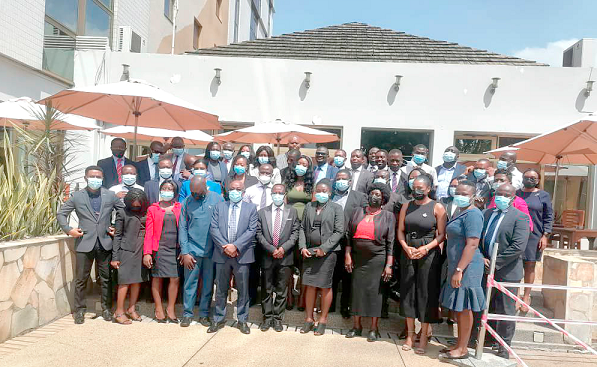
Ghana completes action plan to exit money laundering ‘grey list’
The country has completed the implementation of an action plan required by a global watchdog to enhance internal structures and systems against money laundering and terrorist financing.
The action items were completed in February this year, ahead of the scheduled time, and acknowledged by the Financial Action Task Force (FATF), an inter-governmental body that sets standards for countries to follow in the fight against money laundering and terrorist financing.
Advertisement
The Chief Executive Officer (CEO) of the Financial Intelligence Centre (FIC), Mr Kwaku Dua, announced this at a sensitisation workshop for banking sector practitioners on anti money laundering (AML) and countering the financing of terrorism (CFT) in Accra yesterday.
The workshop was part of a series of capacity-building programmes to help strengthen Ghana’s AML/CFT regime.
He explained that the completion of the action plan now paves the way for the task force to meet later this month to take a decision on removing Ghana from its 'grey list', a condition that affects the country in many ways, including limiting its financial institutions’ ability to access concessionary funds from the international market.
Action plan
Mr Dua said the action plan included the implementation of a policy on AML/CFT, a comprehensive assessment of money laundering and financing terrorism, risks associated with key persons and the improvement in risk-based supervision by regulatory institutions.
He said those actions were aimed at boosting the country's fight against money laundering and terrorism financing.
The plan roll out became necessary after the country was found by the FATF to have some deficiencies in its AML/CFT regimes.
Mr Dua said the action plan was developed by the global watchdog for the government to implement as part of a road map to exiting from the FATF’s ‘grey list’ – a list of countries with weaknesses in their AML/CTF structures.
‘Grey list’
Ghana was placed on the FATF’s ‘grey list’ as a result of some deficiencies identified in its AML regime during the second round of mutual evaluation report (MER).
Following the FATF’s action, the European Union (EU) also placed Ghana on its list of Third World countries with strategic deficiencies in the AML/CFT regime.
To guide the country out of the list, the International Co-operation Review Group (ICRG) tasked the government to complete an action plan, failing which it would end up on the FATF blacklist, which would have adverse effects on the economy and national reputation.
The challenge
The CEO of the FIC said following from the development, the centre, with the support of the government and relevant stakeholders, took up the challenge and executed the action plan even ahead of time.
“At the recently held Inter-Governmental Action Group against Money Laundering in West Africa (GIABA) plenary in Lome, Togo, from May 16 to 21, GIABA commended Ghana’s efforts and hoped that it would serve as a source of inspiration to other member states in the sub-region.
“It is to be noted that Ghana is the first country in the sub-region to have gone through the second round of mutual evaluation and completed the ICRG process in record time,” Mr Dua said.
He said although the country met the expectations of the FATF on the action plan, the FIC would continue to work hard to consolidate the gains chalked up in the fight against the acquisition and usage of ill-wealth, as well as other illegal financial activities in the country.



